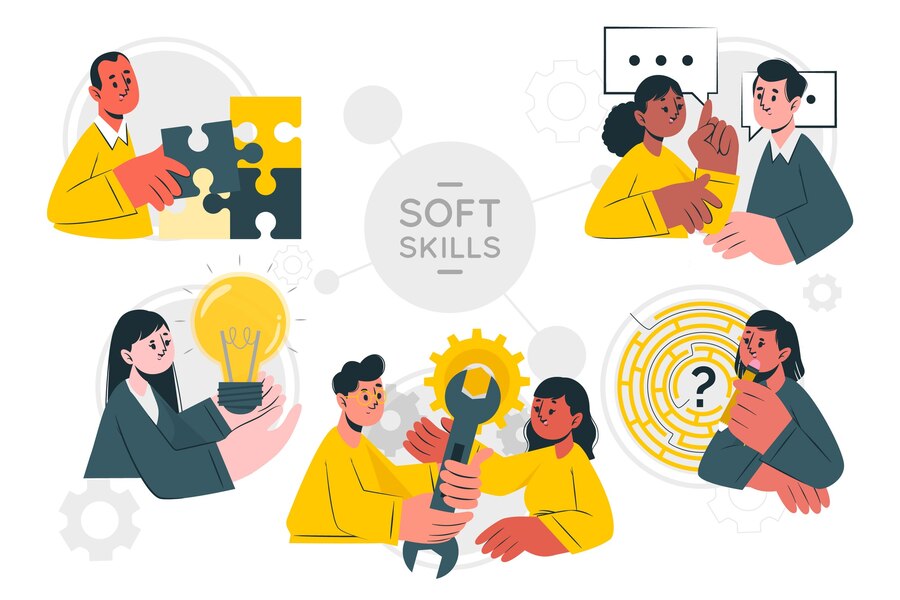Due to technological advancement, the workplace is not static, and the demand for skills is rising significantly. According to the World Economic Forum, technology adoption will remain a key to business transformation. Machines will automate many tasks, but the jobs that require creativity, communication, empathy, and problem-solving will continue to grow. That means human skills are irreplaceable. Advanced technology will evolve with modernism, but the demand for soft skills will rise significantly.
In this blog, we will explore 7 essential soft skills for success and why they are becoming more important with each passing time.
What Are Soft Skills?

Soft skills or interpersonal skills are a set of abilities that allow individuals to carry out all the responsibilities in a professional setting efficiently. These skills include collaborating, managing time, communicating, and many more.
Though soft skills are not quantifiable, they are, however, essential in the industry. Whether you are working with someone from a different background or connecting with clients, the ability to understand interpersonal dynamics that help build relationships plays a crucial role.
8 Essential Soft Skills That Employers Look For

Here are the in-demand skills that every company values:
1. Communication
Communication is an essential key to building strong relationships with colleagues and clients. This not only helps to convey messages compellingly but also enhances the ability to understand others and respond to feedback wisely. Employers look for individuals who can easily build professional relations in the workplace, which is extremely important when working in a team.
Communication is evaluated through informal feedback from colleagues and supervisors. Employers highly value the ability to communicate effectively in a wide range of industries. Active listening, and verbal and non-verbal communication are some examples.
2. Critical Thinking
The 4 C’s crucial for employee success are Critical thinking, Creative thinking, Communication, and Collaboration.
Critical thinking involves questioning, analyzing problems, interpreting, evaluating, and then making judgments. Good critical thinking is all about making value judgments that are based on reliable data. According to data released by PwC, 77% of employers remarked that critical thinking is critical for the business. Also, this is among the top 5 skills that you must inculcate in yourself.
Whether you are from a technical background or a creative field, critical thinking skills will surely make you a better employee.
3. Emotional Intelligence
Emotional intelligence can be defined as the ability to understand one’s own emotions along with understanding the emotions of others. It includes self-awareness, self-regulation, empathy, and motivation. Emotional intelligence helps you connect better with everyone.
In today’s interdependent workplace, these skills help employees navigate complex dynamics and work efficiently
4. Teamwork
Teamwork involves the ability to work together, keeping in mind everyone’s interests and decisions. Individuals who can work collectively in a group are more likely to achieve their goals faster than others. In a professional setting too, good teamwork leads to organizational success along with individual growth.
This encourages individuals to share ideas, brainstorm, and collaborate on new policies. This also enhances the job satisfaction of employees. Collaboration and conflict resolution are some examples of teamwork.
5. Time Management
With proper time management, you can set your priorities, organize tasks, and assign time to different activities. This helps individuals stay productive throughout the day. Along with this, proper discipline is also crucial to avoid distractions that hinder productivity.
Good management skills also help manage stress and anxiety, which can arise due to workload or deadlines. Some examples of time management include planning, setting goals, and many more.
6. Adaptability
In today’s dynamic work structure, adaptability is essential if you want to stay ahead. An employee who can adjust to the changing environment and update themselves regularly to remain relevant is given more preference.
It is impossible to avoid challenges, but adaptability helps avoid setbacks and contribute to the organization’s growth. Some examples of adaptability are a growth mindset, flexibility, and analysis.
7. Work Ethic
This demonstrates an employee’s dedication and commitment to their job. A strong work ethic acts as a signal that you are more reliable. This signal helps improve your credit in the workplace. Employers like to work with individuals who have a strong work ethic and are eager to learn rather than those who are unmotivated or unethical.
Some examples are meeting targets, good communication, punctuality, and more. It is obvious to face challenges, but with a positive attitude, they can be easily tackled.
8. Leadership
A good leader inspires the team to work for greatness. Leaders can influence team members and shape the work structure. If any organization lacks proper leadership, it is obvious that it will face setbacks.
Efficient leadership quality is often praised in professional settings. The secret sauce for success in the modern workplace is leadership. Some examples are problem-solving and strategic views.
Conclusion

According to Deloitte, businesses having a workforce with soft skills have higher rates of innovation and productivity.
While hard skills are important, in the future workforce, soft skills will be increasingly valuable. Employers will prioritize those with critical thinking, communication, emotional intelligence, leadership skills, and a strong work ethic. By prioritizing soft skills, both employees and companies can navigate challenges and work toward success.
However, if you want to know more about how to teach these skills or are confused about the next step in your career, consider talking to us. You can easily go through all our services from our website. We will surely help you stand out from the crowd.
Frequently Asked Questions
1) Which soft skills are best for the future?
Soft skills like leadership, critical thinking, emotional intelligence, communication, and teamwork are essential soft skills.
2) Can I learn soft skills?
Soft skills can be easily adapted. Based on your willingness to learn, you can develop it.
3) Can soft skills give you a job?
Yes, soft skills can give you a job. But you must focus on hard skills along with soft skills, as these two go hand in hand.
Nishant is an Internationally Certified Career Coach, a Career Counsellor, an Education Consultant, a Soft Skills Trainer, and an ardent advocate of youth empowerment through personalized guidance, mentoring, and developmental interventions. He is also an International Economic Development and Business Consultant. Over the years, he has helped many students of different age groups and working professionals in discovering their true selves, setting appropriate career goals, and walking the right career paths.
Nishant is a mechanical engineering alumnus from R.V. College of Engineering, Bangalore. He has been widely featured in top media and also delivered talks at Cambridge University-UK and IIT-Guwahati among others. He has also delivered workshops at many reputed schools and colleges on various careers and skills-related topics.



